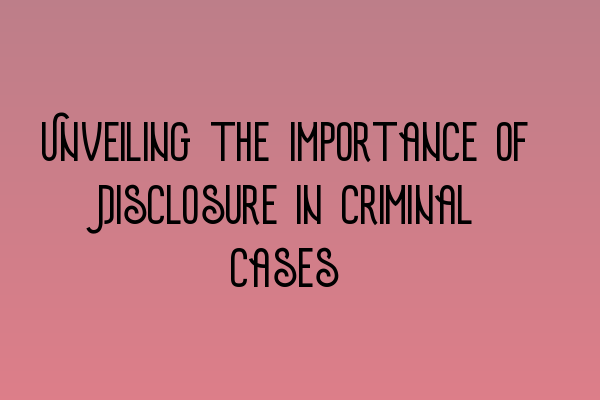Unveiling the Importance of Disclosure in Criminal Cases
Welcome to the SQE Criminal Law & Practice Law UK blog! In this article, we will explore the critical role and significance of disclosure in criminal cases. Disclosure refers to the process of sharing information and evidence between the prosecution and the defense in a criminal trial. It ensures fairness, transparency, and the right to a fair trial for all parties involved.
The Importance of Disclosure
Disclosure is the cornerstone of a fair and just legal system. It enables both the prosecution and the defense to thoroughly examine the evidence against the accused, allowing them to build their respective cases and make informed decisions. The principle of disclosure is essential in upholding the fundamental right to a fair trial.
Proper disclosure ensures that all relevant information, documents, and evidence are shared with the defense. This includes witness statements, expert reports, CCTV footage, forensic evidence, and any other material that may be crucial to the case. Failure to disclose such information can undermine the accused’s ability to prepare a strong defense and may result in miscarriages of justice.
By promoting full and open disclosure, the legal system aims to prevent wrongful convictions, protect the innocent, and maintain public confidence in the administration of justice. It also helps avoid unnecessary delays and allows for efficient case management, ensuring that cases proceed smoothly through the criminal justice system.
Challenges Faced in Achieving Disclosure
While disclosure is vital, challenges often arise in its implementation. The sheer volume of information in criminal cases, digital evidence, and the need to protect sensitive material can pose difficulties. Furthermore, human error or intentional non-compliance can lead to unintentional or deliberate failures in disclosure.
Proper training of legal professionals, effective case management systems, and technological advancements can help address some of these challenges. The SQE 1 Preparation Courses and SQE 2 Preparation Courses offered by SQE Criminal Law & Practice Law UK provide aspiring solicitors with comprehensive knowledge and skills to navigate the intricacies of criminal law, including the disclosure process.
Ensuring Compliance and Best Practices
To ensure compliance with disclosure obligations, it is essential for legal professionals to stay updated with current laws, regulations, and best practices. Regular training and professional development play a vital role in enhancing understanding and implementation of disclosure requirements.
For aspiring solicitors preparing for the SQE exams, it is crucial to practice Mock exams and McQ tests to solidify their knowledge of criminal law and disclosure obligations. The SQE 1 Practice Mocks FLK1 FLK2 and the SQE 1 Practice Exam Questions available on our website can help you assess your understanding and improve your exam readiness.
By prioritizing disclosure and adhering to best practices, legal professionals contribute to maintaining the integrity and fairness of the criminal justice system. This ultimately ensures that justice is served and the constitutional rights of the accused are upheld.
If you are interested in learning more about the SQE exams or want to know the upcoming SRA SQE Exam Dates, visit our website for comprehensive information and guidance.
Thank you for reading this article on the importance of disclosure in criminal cases. Stay tuned for more insightful content from SQE Criminal Law & Practice Law UK!
